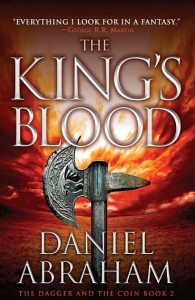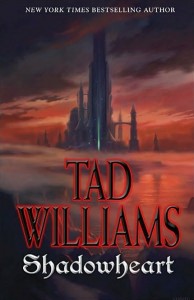It’s no secret that I’m a fan of Daniel Abraham. So, in my ever increasing efforts to promote the genre’s second-hardest working author (because, let’s be honest here, no one can hold a candle to Brandon Sanderson), and one its best-kept secrets, here’s an exclusive excerpt from The King’s Blood, the second volume in The Dagger and the Coin. It’s a tremendous novel and improves on its predecessor in almost every way. If you’re interested, you can read my review of The King’s Blood.
The King’s Blood is available now in the UK and North America from Orbit Books.

Cithrin bel Sarcour
Cithrin bel Sarcour, voice of the Medean bank in Porte Oliva, stepped out of the bank's office with her head high, her features composed, and rage burning in her breast. Around her, Porte Oliva was entering its springtime. The bright cloth banners and glittering paste jewels of the First Thaw celebrations still lay in the streets and alleyways, slowly decaying into grime. Snow haunted the shadows where the midday sun couldn't reach. Cithrin's breath plumed before her as if her heart were a furnace belching pale smoke, and she felt the bite of the air as a distant thing.
Men and women of several races bustled on the cobbles before her. Kurtadam with their slick, beaded pelts; thin-faced, pale Cinnae; brass-and-gold-scaled Jasuru; black-chitined Timzinae; and fleshy, rose-cheeked Firstblood. Some nodded to her, some stepped out of her way, most ignored her. She might represent one of the greatest banks in the world, but as far as the hazy sky over Porte Oliva cared, she was just another half-Cinnae girl in a well-tailored dress.
When she stepped into the taproom, the warm air caressed her. The related, yeasty scents of beer and bread tried to gentle her, and she felt some of the knot in her gut begin to ease. The anger slipped, showing itself only a mask for the despair and frustration beneath. A young Cinnae man came forward to take her shawl, and she managed a tight-lipped smile as she relinquished it.
"The usual table, Magistra?" he asked.
"Thank you, Verril," she said. "That would be kind."
Grinning, he made an exaggerated bow, and gestured her on. Another day, she might have found it charming. The table was at the back, half hidden from the main room by a draped cloth. It cost a few coins more. When she felt capable of civil conversation, she would sometimes sit at the common benches, striking up conversation with whoever was there. There were more sailors and gossip of travelers farther south at the docks, more word of overland trade north where the dragon's road opened to the main square and the cathedral and the governor's palace, but the taproom was nearest to her bank–her bank, by God–and not every conversation needed to be a bid for advantage.
The Kurtadam girl who most often served in the daytimes brought a plate of cheese and brown bread with a tiny carved-wood bowl full of black raisins. More to the point, she brought a tankard of good beer. Cithrin nodded sharply and tried to make her smile genuine. If the girl saw anything odd in her, the soft fur of her face covered it. Kurtadam would make good card players, Cithrin thought as she drank. All of them wearing masks all the time.




